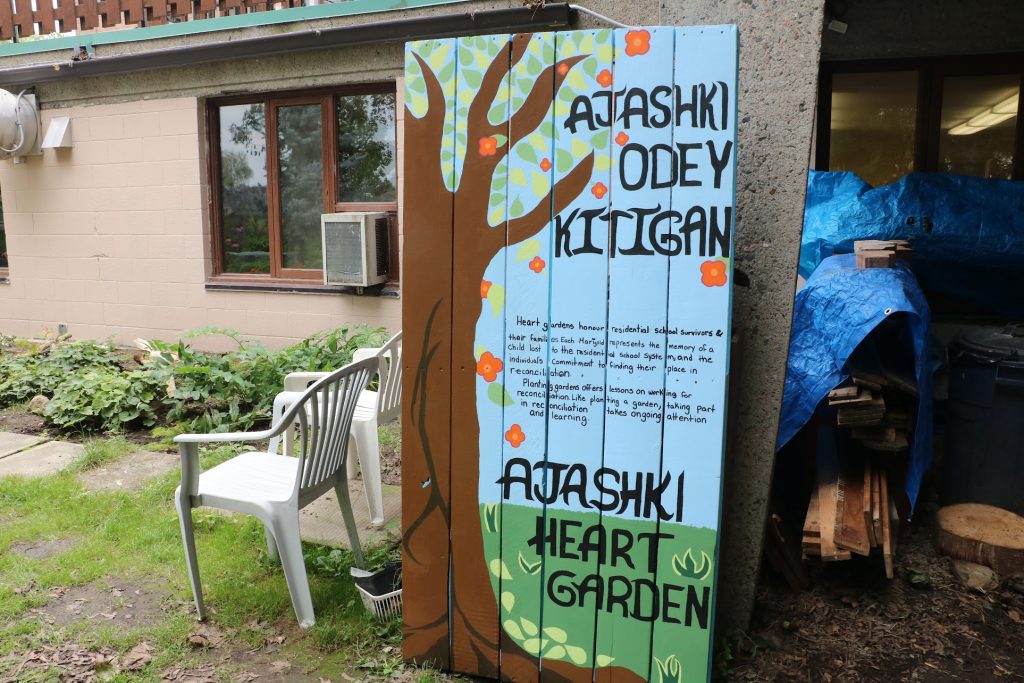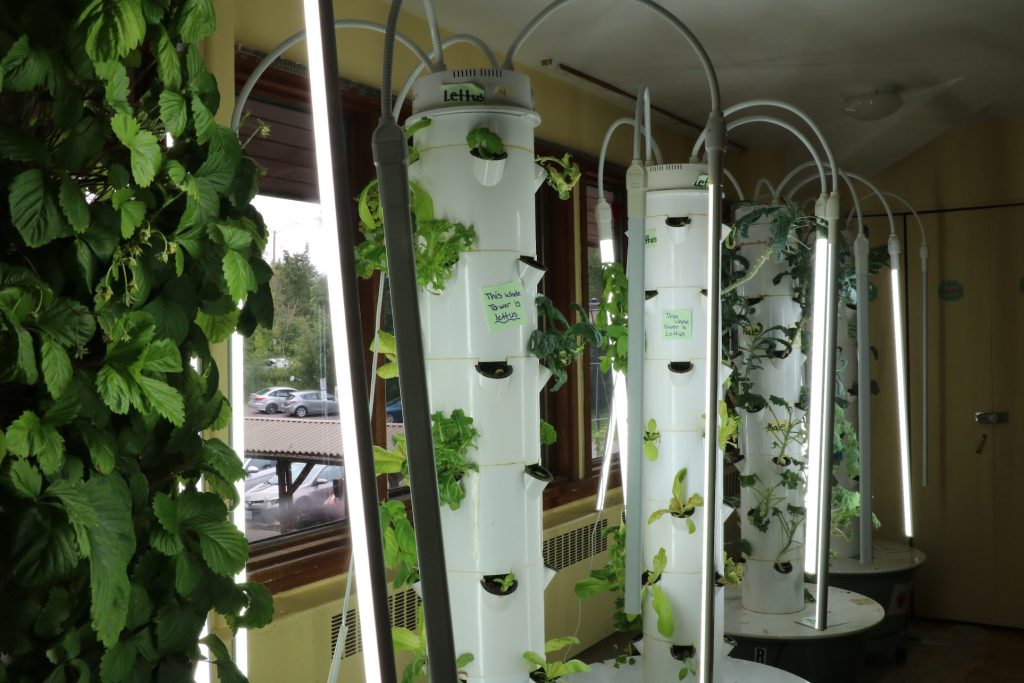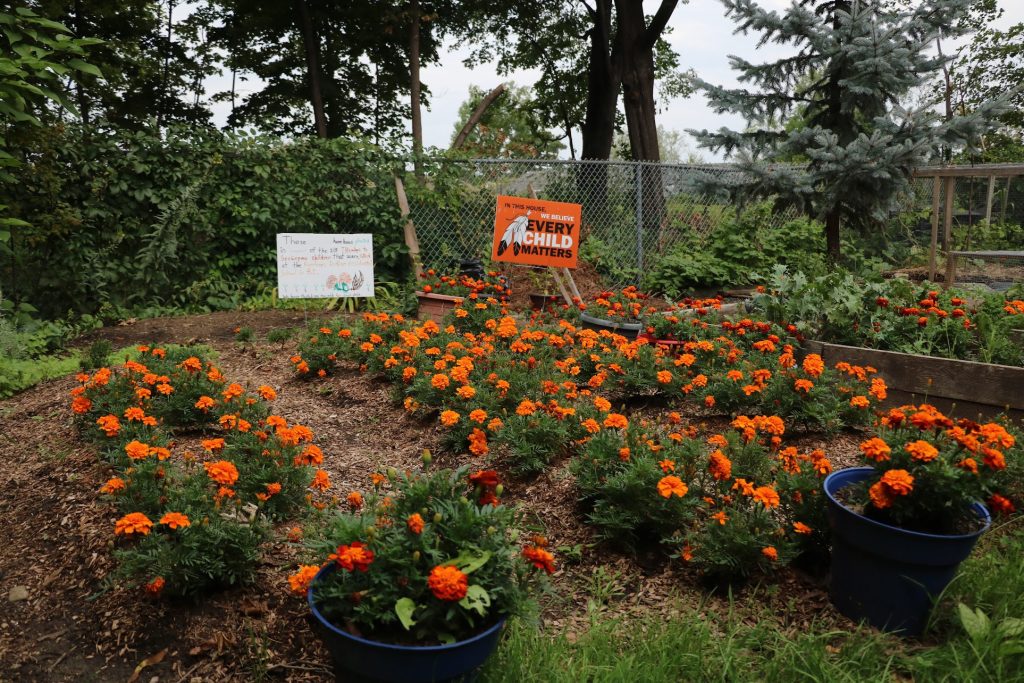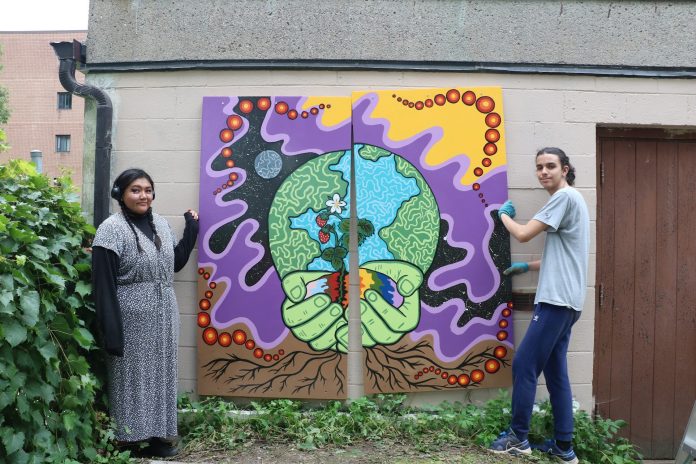By Daria Maystruk
It’s lunch time on a mid-August afternoon and members of the Ajashki Food Security and Climate Change Learning Centre gather at the First Unitarian Congregation of Ottawa.
They share stories about their pets while eating fresh pizza made from ingredients grown just a few steps away. The couches are pushed along the blackboard-lined walls, forming a circle. There is Inuktitut and Algonquin vocabulary posted around the room and a sprawling to-do list written in chalk.
Some of the tasks for the day include sweeping, installing a mural, watering the plants and anything else the staff thinks of.
Throughout the rest of the day, the staff work together on the Ajashki Garden Project. Ajashki — the term for “soil” in the Algonquin language — employs urban Indigenous youth to give them agency in food security and climate change education.
The staff tend to the outdoor gardens every Tuesday and Thursday in the summer. In the winter, they continue to work once a week thanks to hydroponic gardens in the upper level of the church.

The Ajashki Food Security and Climate Change Learning Centre was formed as a response to the Truth and Reconciliation Commission’s Call to Action. According to one of the founders, Sharen Bowen, the idea came from Kitigan Zibi Elder Verna McGregor during a sharing circle in 2020.
“It was like she conceived the idea, it was born and then we picked it up,” Bowen said.
In the beginning, they employed three “future food warriors,” a term for the centre’s employees coined by the project’s lead educator, Kayoki Whiteduck. This year, there are 11 youth employees — mostly Inuit and First Nations — in addition to 13 volunteers who make up the “Circle of Support.”
Rhe Blanco, a youth member who has worked at the centre since its conception, said their favourite part about the centre is the variety of activities they do.
“When I first came here, I knew that we were going to be learning about culture and climate change and doing gardening, but there’s all these other things that we’re doing,” Blanco said. “We do a lot of workshops about beading and woodwork and there’s also documentaries that we watch about climate change and food security, so there’s a lot of learning parts to it that are fun.”
Whiteduck, also an Algonquin Anishinaabe horticulturalist from Kitigan Zibi, said he likes to structure hands-on lessons. He briefly discusses one or two topics a day before jumping into the work.
“I find that’s the best way to learn and I think a lot [of the youth] feel the same,” Whiteduck said. “Some of them have shorter attention spans, so watching an hour long video about a subject isn’t always the greatest way to learn for them.”
Experienced Future Food Warriors also help teach the new members, he added.

As for Whiteduck, the topic of food security around the greater Ottawa area has been one of the most important lessons he has learned as the lead educator of the project.
“Even in the last three years of COVID … the food centres now have more people and more mouths to feed than ever,“ he said. “I’m a farmer and I believe food is a human right. We shouldn’t have to go to bed hungry.”
The centre has recently introduced a food cupboard program for members of the community. Lisa Sharp, former president of the board, said it was “a chance to learn about some members in our community, including some of our staff, who have food insecurity issues.”
“A lot of the young people coming to this program, they weren’t eating for days … we would feed them breakfast and lunch, [but] twice a week isn’t enough,” she said.

With the food cupboard, the group is able to provide adequate access to ingredients while accommodating varying housing situations, Sharp explained.
With each aspect of the centre, Bowen said they hope to also improve the mental health of the participants.
Michael Mathewsi, who joined the team in June, said the food and the people have been the most impactful parts of his involvement with the centre so far.
“My relationship with people has been getting better. I’m coming from a spot of a couple years of homelessness … I was surrounded by negative influences, but there was a positive side of it [and] some life experiences,” he said. “[Here] I get to learn a lot more about the people here and the staff that work here. It’s amazing.”
The centre also donates their extra food items to others in the greater Ottawa community such as the Parkdale Food Centre. This reciprocal aspect of the project has become one of their core values.
“We try to support activities so that anyone, whether they’re Indigenous or non-Indigenous, can come together and become friends. And it’s working,” Bowen said.
Looking to the future, Bowen and Sharp said the centre is hoping to expand their reach through ongoing partnerships in the community. Bowen said anyone is welcome to join their Circle of Support and she encourages donations, whether monetary or by food donation.
“We have to understand how to work with Indigenous peoples, so this is teaching us a lot about how to figure out what we can do together,” Bowen said. “And that’s the whole point around reconciliation … non-Indigenous people have to do the work because it’s learning about, accepting and supporting each other.”
